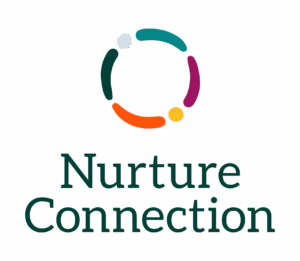
In July 2025, Nurture Connection surveyed our national network of Early Relational Health (ERH) champions and partners to help guide our efforts to advance ERH and promote strong, positive, and nurturing early relationships. Through this survey, we hoped to better understand the evolution of awareness, policy, and practice related to ERH, and to identify new opportunities for advancing ERH in the early childhood field.
We saw great engagement, with high-quality insights and suggestions from survey participants. The survey successfully captured a wide range of roles and organizational types, with 360 respondents across 46 states and territories — reflecting both the impact of Nurture’s efforts to date as well as a path forward to continuing this important work.
“We really got a broad, cross-sector sweep of the early childhood ecosystem, especially early care and education, mental and behavioral health, pediatric family health, home visiting, and early intervention,” shares Nurture Connection founder David Willis, “which is in keeping with who we are and how we want to continue reaching out.”
|
Survey Respondents Organizations
Type of work with children 0–3
|
Awareness of and Interest in ERH Is Growing
As Patsy Hampton, deputy director of Nurture Connection, notes, “ERH is a unifying platform for different sectors in early childhood to collaborate on relational approaches.” Knowledge and usage of the term “Early Relational Health” appear to be growing; 80 percent of respondents said they noticed people becoming more familiar with “Early Relational Health,” and 62 percent of respondents said they use it in their work or community engagement.
In addition to growing awareness of ERH, more people see the importance of ERH in building thriving, flourishing communities — and their roles in promoting it. Over 60 percent of respondents see their work reflected in Nurture Connection’s North Star and impact statements, and also see themselves playing a role in advancing ERH — which speaks to the catalytic nature of Nurture Connection’s network.
|
Nurture Connection’s Impact Statement: “The principles of Early Relational Health have been integrated into communities across the U.S. that are committed to fostering and sustaining positive, thriving connections. As a result, families and young children, along with the systems and practitioners that serve them, benefit from connection, repair, and healing through family-community partnerships and family-centered practices and policies, ultimately leading to flourishing children and families.” |
|
Nurture Connection’s North Star Statement: “All communities thrive because every caregiver and young child flourishes from authentic parent partnership approaches and culturally aligned practices, policies, and agreements.” |
As awareness and interest in ERH continue to grow, learning from others is increasingly important. Seventy-five percent of respondents felt that Nurture Connection was having the greatest impact by expanding the knowledge base and sharing information and resources that showcase ERH in action, including the Nurture Connection website, monthly newsletter, and blog.
“I love the bright spots that [respondents] identified. . . . They really reflected where we’ve been thinking that our work needs to go.”
—Patsy Hampton
Deputy Director, Nurture Connection
Continued Opportunities for Incorporating ERH into Practice
Nurture Connection continues to have an impact on practice transformation, with broad application for ERH across various sectors — and in particular, settings like early care and education, healthcare, and home visiting. “As we try to think about influencing the field and the value add that we have to professional development, to workforce development, to career trajectories,” shares Hampton, “those settings are really key to that. And that felt very reassuring.”
Centering Family Partnership
One of Nurture’s core values is centering parent partnership, an approach grounded in principles of codesign. Partnering with families remains critical to advancing Early Relational Health, and to that end, the survey asked respondents how they were engaging families. As Hampton notes, people are engaging families across different sectors — “but I think more importantly, they really succinctly described the challenges [when it comes to partnering with families]. . . . They gave us a really clear idea of what they need, which is to know a little bit more about ways to do it. We feel like we have a lot to share in that space.”
Looking Ahead and Reflecting Forward
The path forward is not without its challenges. As survey participants noted, early childhood advocates and workforce staff often face many competing priorities when it comes to time, funding, and compensation for family contributions, all further compounded by issues of trust and historical harm as well as structural, systemic barriers within institutions. Respondents also expressed a need for more models and guidance, and leadership buy-in when it comes to authentically integrating family partnerships as well as political uncertainty.
Yet despite these factors, respondents were determined to continue doing the work in new and creative ways, with policies like paid family leave cited as opportunities that are most likely to have a substantial impact on improving ERH. Paid family leave was the most supported policy (67 percent) with the greatest potential to advance ERH, followed by state and local early childhood hub structures (44 percent) and workforce expansion (40 percent).
Explore more survey findings at this link.
With all of these challenges and opportunities in mind, Nurture Connection remains dedicated to finding new opportunities to promote and strengthen the foundations of Early Relational Health. And all of this work continues to be further amplified across many sectors, roles, and organizations by building a networked and engaged movement in partnership with parents and families — one connection at a time.
“More and more, we’re seeing that Early Relational Health can be a unifying foundation for different early childhood systems to come together in support of children and families.”
—Patsy Hampton
Deputy Director, Nurture Connection
Explore More:
-
-
-
-
-
-
-
- Explore more survey findings at this link.
- Sign up for Nurture Connection’s monthly newsletter at this link.
-
-
-
-
-
-